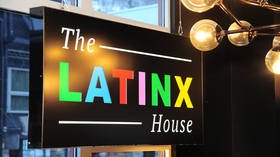Latino rights group wants to drop ‘Latinx’ term

The oldest Latino civil rights group in the US is mulling dropping the word “Latinx” from its official communications. A fresh poll showed the term is perceived negatively by some 40% of Latino voters.
Domingo Garcia, president of the League of United Latin American Citizens (LULAC), sent an email on Wednesday to other members of the group’s management, suggesting that they should stop using “Latinx” because it was “very unliked” by the very people they serve.
You don’t have to believe me about how unpopular the term Latinx is among Latinos. Listen to the largest and oldest Latino civil rights group in the country. Latino civil rights organization drops 'Latinx' from official communication https://t.co/h6yArPbGpZ via @nbcnews
— Ruben Gallego (@RubenGallego) December 9, 2021
He added a link to a Miami Herald editorial reporting a fresh opinion poll by Bendixen & Amandi International, a Miami-based Democratic firm. The national survey of Latino voters showed that they prefer to describe themselves as “Hispanic” or “Latino/Latina”.
The term “Latinx” was favored by only 2% of those polled, while 40% said it bothers or offends them to some degree. A whopping 30% said they would be less likely to vote for a politician using the word.
“The reality is there is very little to no support for its use and it’s sort of seen as something used inside the Beltway or in Ivy League tower settings,” Garcia told NBC News, explaining the decision. LULAC represents people “on Main Street in the barrio and we need to make sure we talk to them the way they talk to each other.”
He stressed his intention was not to ban “Latinx” altogether and that the group supports people who identify themselves as Latinx. The decision was simply about speaking the language of the common people, Garcia assured.
“Latinx” is intended to promote inclusivity by replacing the gender-specific letters “o” and “a” in Spanish word endings with a neutral letter “x”.
Since its introduction by the academia in the mid 2000s, it was mostly rejected by the older generations of Latinos, but gained traction among some younger politically active people. The term also found its way into liberal-leaning US mainstream media.
Critics say it’s largely a ‘woke’ construct and a word that is simply too awkward to pronounce for Spanish-speakers. The Spanish language doesn’t normally use words ending with an “x”, except for those that have been borrowed from other languages like English and French.
Latino voters have long been a devoted Democrat base, but the GOP has recently made some advances in swaying them. A Wall Street Journal poll published this week showed that Hispanics were currently split evenly between the two parties in a Congressional vote, with 22% undecided. In a rematch between Joe Biden and Donald Trump, 44% said they would back the incumbent president and 43% preferred the former one.













